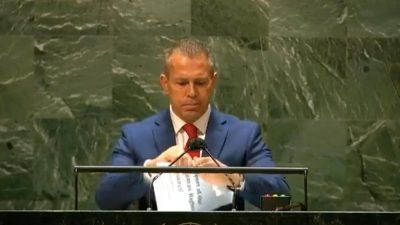Ripping Up the Evidence: How Israel Maintains Global Impunity
From Chaim Herzog in 1975 to Gilad Erdan last year, Israeli officials have taken dramatic steps to avoid accountability for the state's crimes

All Global Research articles can be read in 51 languages by activating the “Translate Website” drop down menu on the top banner of our home page (Desktop version).
To receive Global Research’s Daily Newsletter (selected articles), click here.
Visit and follow us on Instagram, Twitter and Facebook. Feel free to repost and share widely Global Research articles.
***
On 10 November 1975, the late Chaim Herzog, then Israel’s ambassador to the United Nations and the father of President Isaac Herzog, stood on the podium at the UN General Assembly and dramatically tore up the text of Resolution 3379, adopted that same day.
Resolution 3379 declared that “Zionism is a form of racism and racial discrimination”. Israel was shocked. A major boulevard in Haifa named in honour of the UN was swiftly renamed “Zionism Boulevard” by the Haifa City Council. What a joke of fate: the street once named in gratitude to the UN for declaring in 1947 its support for Israel’s establishment as a state was renamed three decades later due to a different decision of the same organisation.
Chaim Herzog was an immediate superhero in Israel. It was the peak moment of his career. Israelis deemed his theatrical gesture a fitting response to what the country perceived as an act of global antisemitism. Nearly all Israelis, the younger me included, held that opinion at the time. Comparing Zionism to racism? It could only be antisemitism.
Years passed. The UN rescinded that decision in December 1991, but another few decades later, everything looks different again. Zionism, which today is essentially about the preservation of Jewish supremacy in a country inhabited by two peoples, no longer seems too far off from how it was presented in the original UN decision.
Likewise, the gesture made by Herzog senior at the UN podium – shredding the pages of a decision that the majority of the world’s nations had accepted as lawful – seems much less appropriate today than it did at the time.
Human rights violations
What has shifted not an inch since the adoption of Resolution 3379 in 1975 is Israel’s attitude towards international organisations and international law. Nearly half a century later, we find the current Israeli ambassador to the UN, Gilad Erdan, doing something similar. On 29 October 2021, he stood on the same stage and tore up the latest annual report of the UN Human Rights Council.
This time, the performance was perceived as repulsive and violent, and earned much less respect. But Erdan also suggested consigning the report to its rightful place in “the dustbin of antisemitism”.
That Israel is not alone in its human rights violations – that other countries behave likewise, but earn far less international censure – is considered adequate to justify Israel’s complete failure to respond to the accusations levelled against it.
It’s like a driver caught speeding recklessly, who tries to avoid legal consequences by saying that everyone drives that way. This is a useless ploy when used on traffic cops, and it should be similarly useless when directed at the institutions of the international community.
So, here is the story in a nutshell: a country established thanks to the power of the UN and the international community acts to undermine the same international bodies the moment they become critical of its behaviour. Just note how compliant Israeli media reports on members of the various international commissions of inquiry into Israeli actions.
Consider the most recent portrayals of Navi Pillay, who spent six years as the UN high commissioner for human rights and now chairs the UN commission of inquiry into Israel’s bombing of high-rise towers in Gaza in May 2021: Pillay “is mistaken”, “hates Israel” or “is an antisemite”.
Shooting the messenger
Not everything was made public on Israel’s efforts to destroy the reputation of Richard Goldstein, who headed the UN team of inquiry into the 2008-09 Gaza war. Still less is known about its attempts to target Fatou Bensouda, the former chief prosecutor of the International Criminal Court, after she finally summoned the courage to open an inquiry into suspected war crimes by Israel.
Israel repeatedly employs an old but effective strategy: if you cannot handle the message, shoot the messenger. Following the decision to open that inquiry, Bensouda resigned, and nothing has been done since. UN commission members probing the latest Gaza war have been refused entry to Israel, as the government declines to cooperate with their work.
Israel has much to hide. Yet, even that has not provided incentive enough to scale up the investigations.
This is working for Israel. Erdan has just been elected as a vice president of the UN General Assembly. Investigations of Israel are conducted at a suspiciously leisurely pace. Let’s not even mention the word sanctions; what was fine for dealing with Russia just a few weeks after its invasion of Ukraine has never been on the agenda with regards to an amazingly similar occupation, more than half a century old and counting, by Israel.

